Alum’s Short Film Sheds Light on Braving an Abusive Relationship
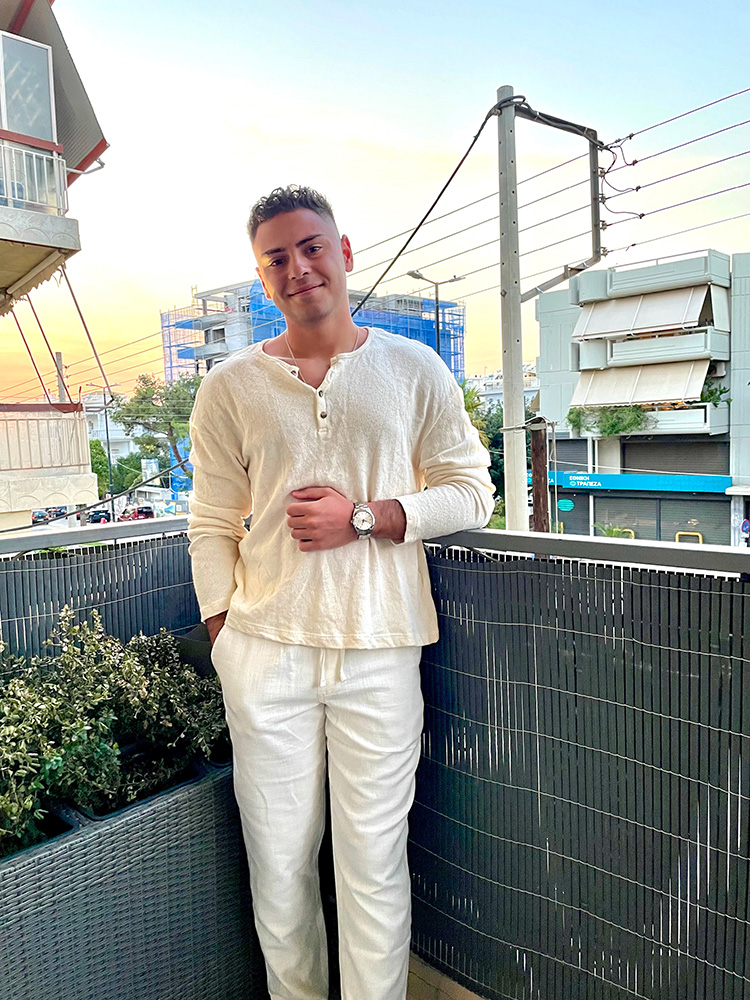
Diran Shahrik (CGS’21, Questrom’23) is the writer and producer of the short film Tethered.
Alum’s Short Film Sheds Light on Braving an Abusive Relationship
Tethered, which follows a teenage boy struggling against his father’s physical and emotional abuse, screens Friday in Newton
What happens when a BU Questrom School of Business graduate takes up filmmaking? Movie magic.
Diran Shahrik (CGS’21, Questrom’23) has combined his knack for numbers—he works in finance at Ernst & Young—with his creative skills to produce films. His 2021 movie, Picking Daisies, won best editing at the HBO-sponsored Official Latino Film & Arts Festival.
Shahrik’s new short film, Tethered, which he’s been working on for the past two and a half years, will screen Friday, April 25, at 6 pm in Newton, Mass. The film follows a 17-year-old boy struggling against his father’s physical and emotional abuse as he fights to escape. A poignant dive into a teenager’s internal conflict, Tethered explores the complexity of living with a parent with borderline personality disorder.
Throughout the process of creating Tethered, Shahrik worked closely with other BU alums: Christopher Moore (COM’20) directed the project; Sam Millstein (COM’19) was assistant director and producer; Renee Nabinger (COM’20) was cinematographer; Joseph Nell (COM’20) was line producer; Rachel Nadjarian (Questrom’97) was one of the executive producers; and Veronica Kelegian (CAS’22) acted in the film.
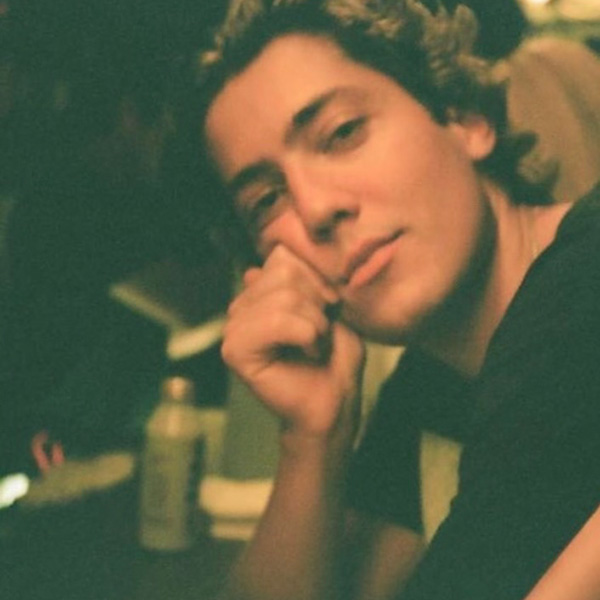
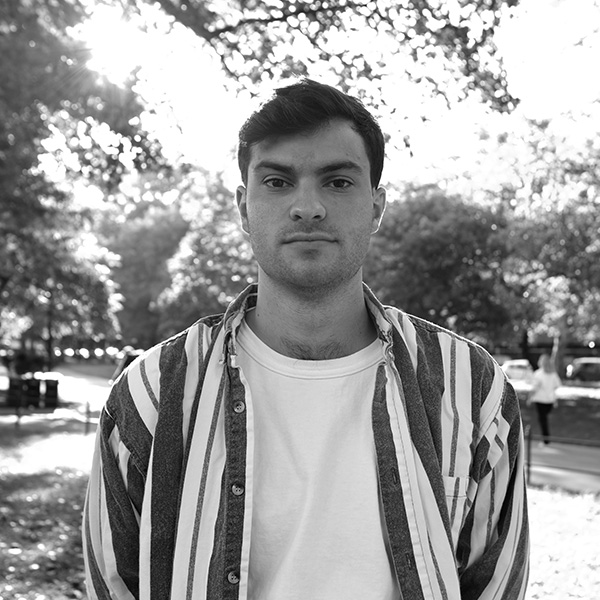
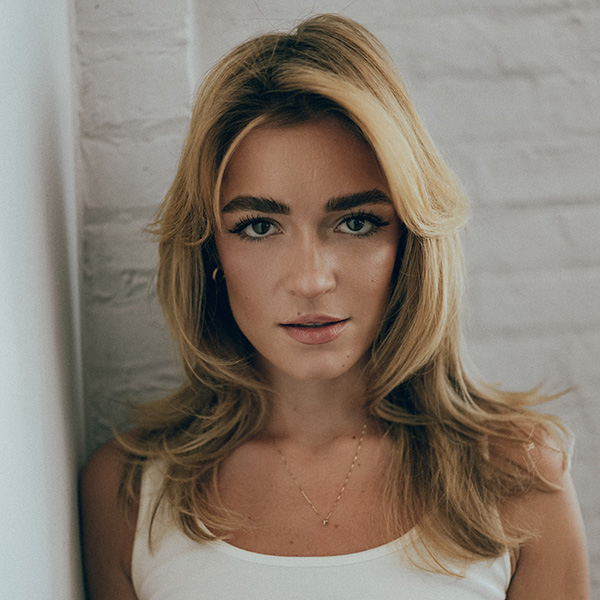
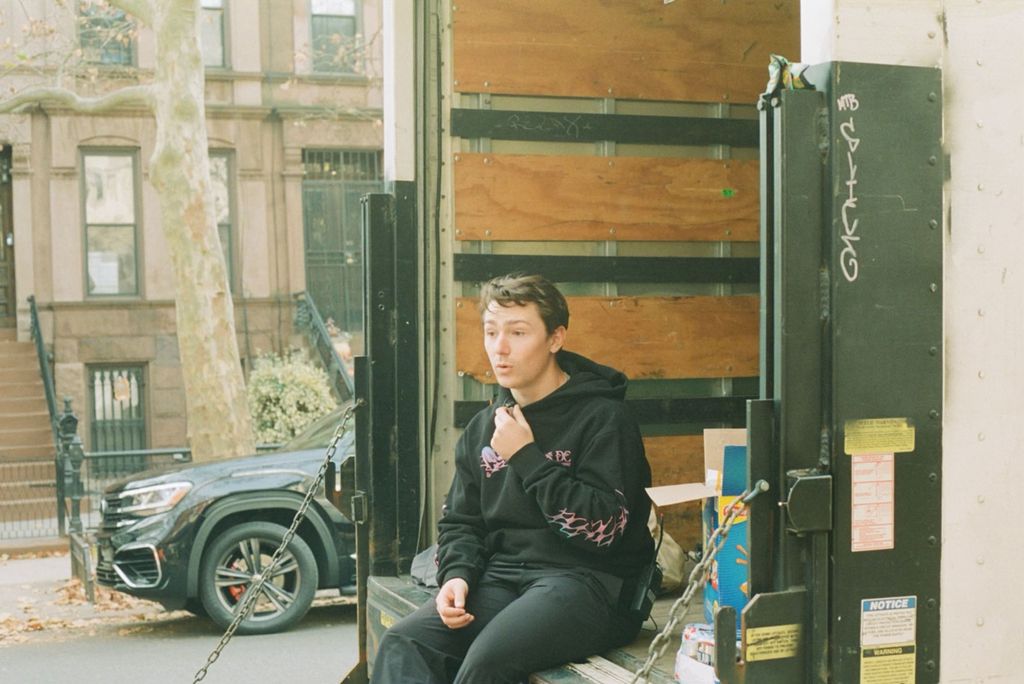
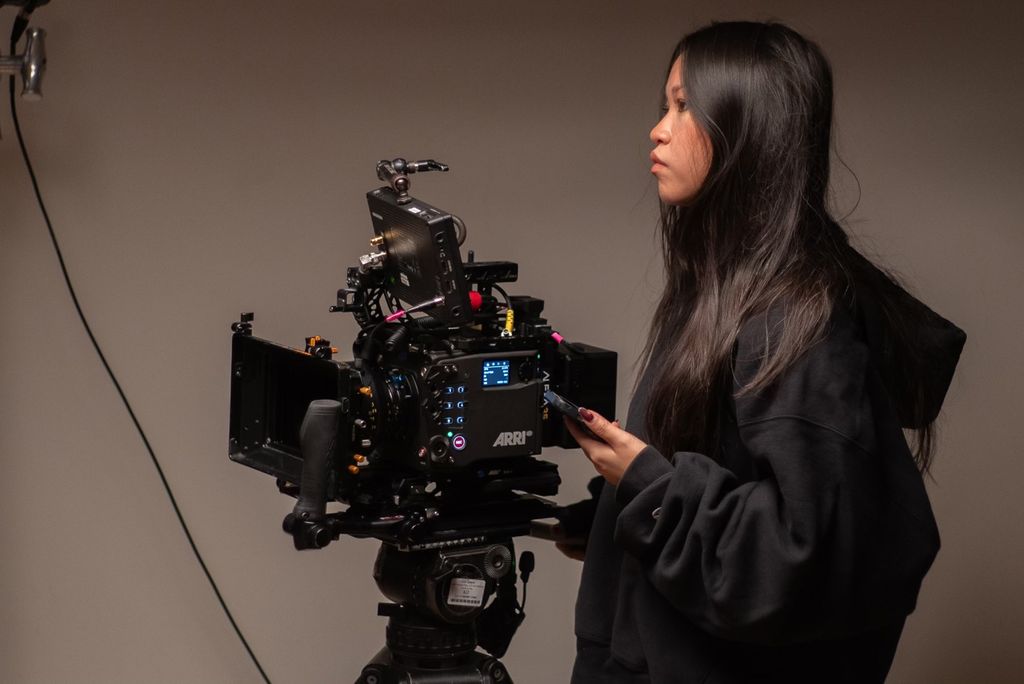
The BU alums involved in the film (clockwise from top left): Christopher Moore (COM’20), Sam Millstein (COM’19), Veronica Kelegian (CAS’22), Renee Nabinger (COM’20), and Joseph Nell (COM’20).
In advance of the film’s screening, Bostonia talked with Shahrik about his personal connection to the story, the funding process, and the team’s role in bringing the project together.
Responses have been edited for brevity and clarity.
Q&A
With Diran Shahrik
Bostonia: What drew you, a finance grad who now works for Ernst & Young, to filmmaking?
Diran Shahrik: It’s definitely been a through line in my life. I came to BU in January of 2020, and I was in the College of General Studies because I wanted to go abroad—I thought London would be a good experience—and I wasn’t sure yet if I wanted to do Questrom. And a month into my freshman year, the pandemic hit. So my summer semester wasn’t in London, it was back in California.
I remember having a conversation with my cousin, who is a huge proponent of how time is a one-way currency and how every minute matters… So rather than putting ourselves in these boxes and these singular, defining journeys that we are on, I felt like maximizing that every minute I have is important here. That’s why not only have I done finance, I’m very interested in the creative side, which is film. I also have a start-up through the University.
Not limiting yourself is something that I am really a big proponent of in my life.
Bostonia: Tethered draws on your own experience of navigating—and eventually overcoming—a toxic family dynamic as a teenager. How did you decide to make a film about this deeply personal story?
Diran Shahrik: Picking Daisies won [best edited film] at an HBO film festival, which was nice. But I remember after that—it’s so funny—I told myself, “I’m not going to do this again. This is so much work. I want to focus on school and finance.” But it’s very addicting—once you start, you kind of can’t stop. I remember sitting in one of my Questrom classrooms and just searching for different ideas, and I wasn’t getting inspired. For me, I had not dealt with this [experience]. It’s one of those things where you kind of suppress it and you push it down, and it was right in front of my face the whole time. So this was an opportunity, not only to show the film, but also, personally, to heal in a way.
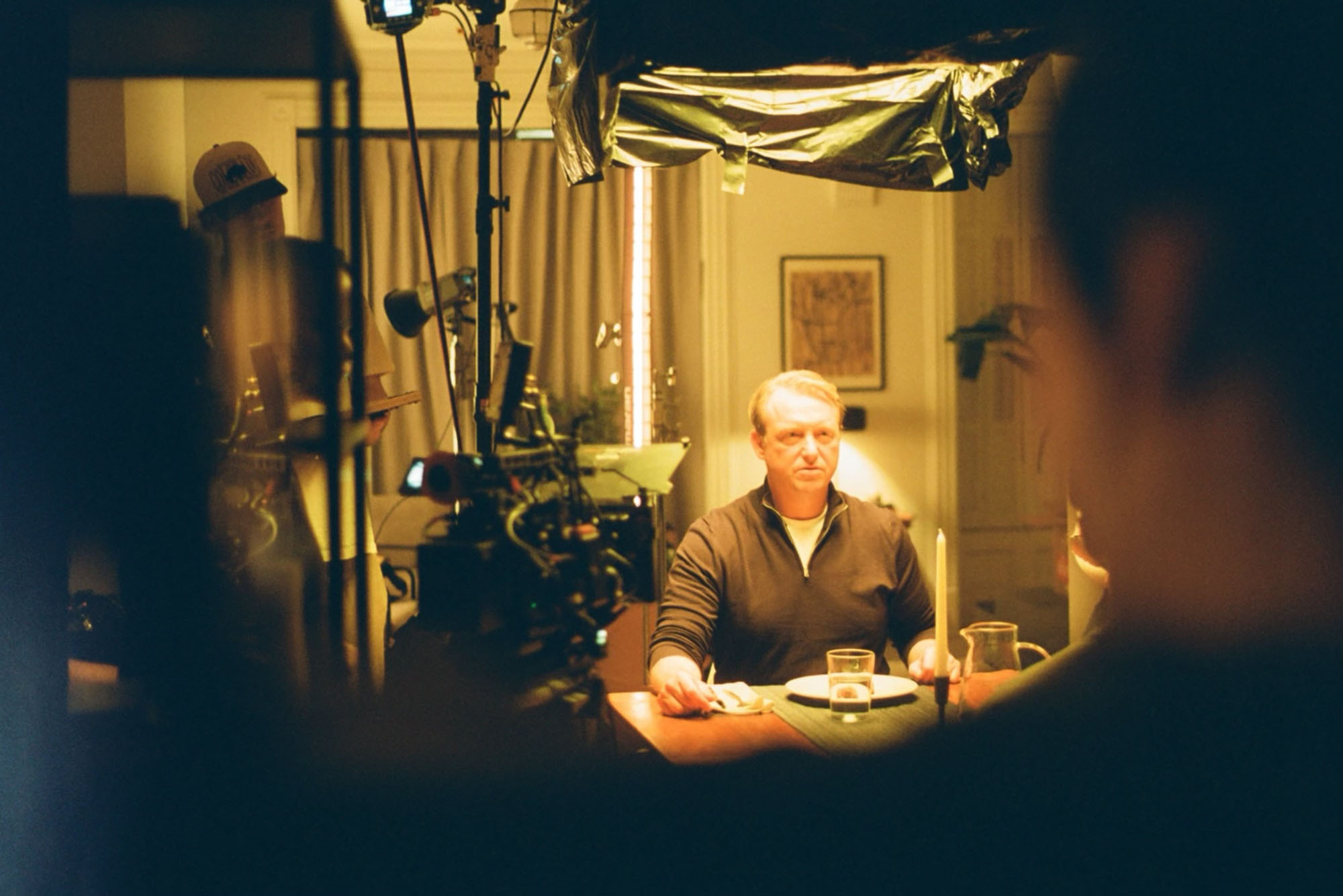
Bostonia: What is it like balancing being a filmmaker and working in finance?
I’m also doing the CFA [Chartered Financial Analyst] program right now; I’m a level two candidate. So I’m juggling a lot, but I really enjoy finance. That’s what I studied, and I enjoy constantly learning new things, which is why I’m also taking on the CFA.
With film, it is complementary in a way, because there is a business aspect to it. We wanted to incentivize investors to invest in the project. Not anyone is just going to give you money for a good story. Unfortunately, this is the world we live in. What is in it for them? One of the ways in which we did that was working with an entertainment lawyer to incentivize high-level investors to invest when we provide a business write-off.
But then we took it a step further and we were like, how do we really incentivize the average donor? That was why we applied and got accepted to be fiscally sponsored by From the Heart Productions, so that every donation to the film is fully tax-deductible. And now we’re hosting these two screenings, because all the proceeds from the screenings will go toward the film and the submissions for the festivals.
Bostonia: What was the process of raising money for the film?
In April of 2022, Chris Moore and I first connected on this project… And then we wanted to connect with Sam Millstein, who has done stuff with Netflix… We were like, the first step here is to shoot a trailer. Let’s shoot a crowdfunding video as a proof of product. An MVP, a minimum viable product. The same way that’s applicable to start-ups, it’s applicable to films. No one’s just going to donate off a paragraph of what you think the film is going to be. You’ve got to show it.
After interning at Ernst & Young in 2022, I took my internship money and put it toward the trailer. We shot the trailer in Los Angeles. We used actors based in Los Angeles, initially, which were different actors and a different cinematographer. We got the trailer and crowdfunding stuff done by December. In 2023, we started raising funds, and around April 2023—so about a full year—we were at around $13,000. But then from April ’23 to April ’24, there was a lull and it was really hard. That’s because of graduating, and I also started work, and Chris was busy, Sam was busy. We only got to about $20,000 in that year, from April ’23 to April ’24.
So I came to Sam. Sam is an amazing producer, and he line produces. He basically took the script and budgeted out the whole project, with respect to the days and to cast and crew. We had done our casting through Actors Access, and through our mutual connections, we brought in Veronica to play the mom in the film. At that point, we were like, let’s just do it. Let’s shoot the film for $20,000 and then, for postproduction stuff, we’ll come up with some ideas.
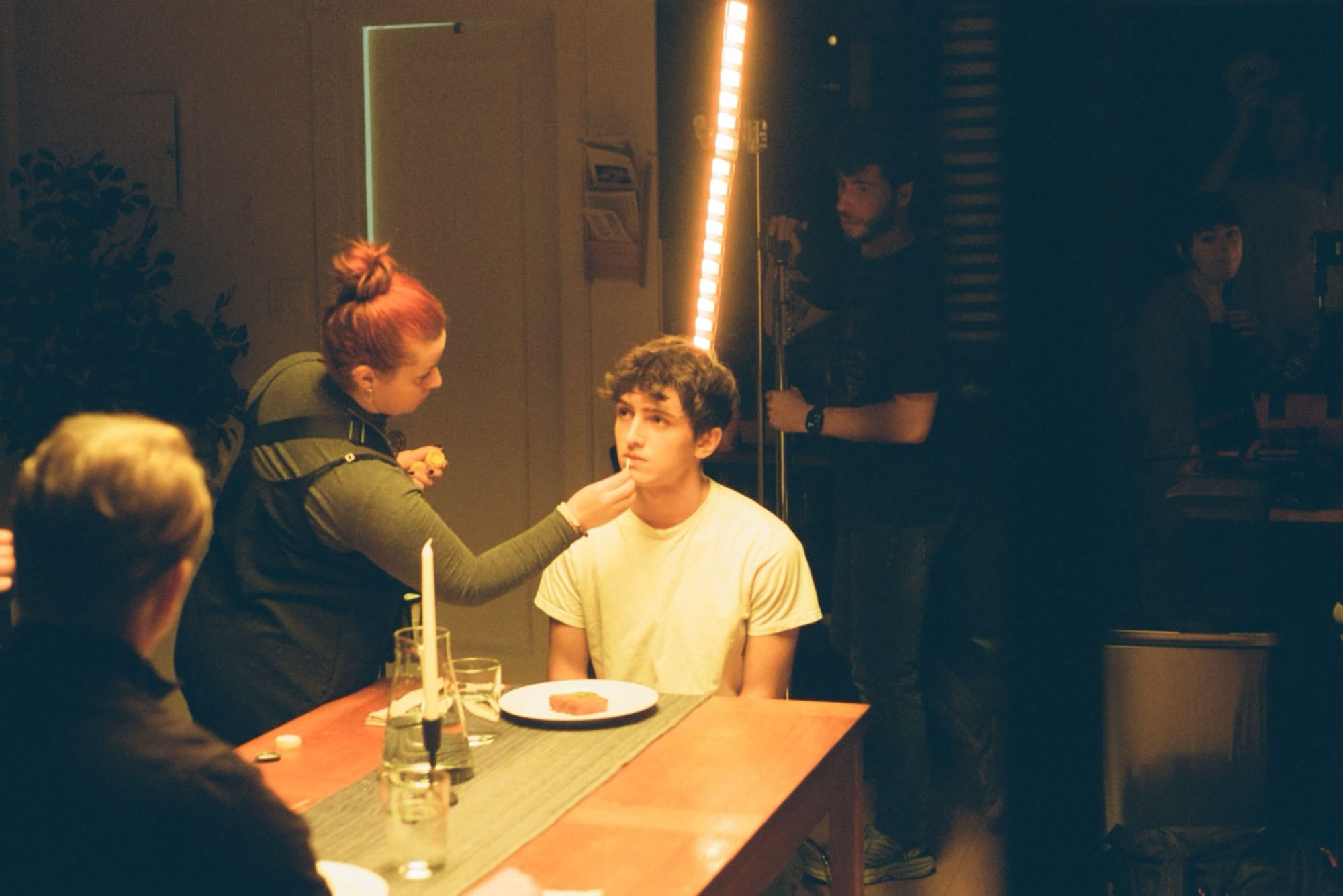
From November to about March was shooting the film, editing the film, and getting it scored. I want to give a huge shout-out to Arman Aloyan, who’s based in Los Angeles. He’s an Armenian friend of mine who did a phenomenal job on the score and completely bought into the project. He’s really, really talented, as well. David Porter—his sound design studio does music, film, everything—is currently sound designing it. We put a temporary color on it, and got it as close to final as possible. But, obviously, postproduction funds not only go to contingency of the production, because we were a little bit over budget, but also to coloring, festivals, sound design, music.
That’s why this fiscal sponsor came in. We needed to incentivize investors who had invested all back in 2022 and 2023 to invest again. So we had done the casting change, we got it fiscally sponsored, and right now we’re raising funds that are fully tax-deductible. We’re doing these two screenings, and all the ticket proceeds go to the film. And so as much exposure as possible for this really, really goes a long way.
Bostonia: What was the role of the BU community in making this film?
BU will always have a close place in my heart, because it really empowered me to do a lot of stuff. The start-up that I had done, I literally started it on my first day at BU, and it got recognition from Poets&Quants and a BU Today article. BU is great because all the opportunities are there—the networking is there, and the network is so massive. If you’re willing to put in the work, BU will help you, for sure. You just have to be willing to do the work and do the effort.
Chris directing the films was massive, obviously. Endless nights, endless hours talking to him over the past two and a half years. Sam Millstein, as well, who assistant directed and produced. Joseph Nell, who I had met on set, had line produced through those two days of production. Veronica, who’s an amazing actress, up-and-coming, who played the mom in the film. Renee, who did a phenomenal job behind the camera as a cinematographer on the project. It was really, really great. And I hadn’t met them [before] because they had all graduated. I graduated in ’23 so I’m only 24—they’re all older than me. To have people who are older than you really buy into and believe in a project that you’re working on means a lot too.

Bostonia: What do you hope audiences take away from this film?
We all, as human beings, get caught up in our small world. If you zoom out, we realize that we’re just a speck in this massive universe that we exist in, that we don’t even know why we’re here. And for me, I would just hope that someone would watch this and apply it to their own hardships and challenges, whatever they may be. It’s not going to be directly this per se, but everybody deals with large or small complications and challenges, and it’s an everlasting journey of overcoming those challenges. So I would really hope it would inspire that.
There will be two screenings of Tethered on Friday, April 25, at 19 Needham St., Suite 207, Newton, Mass. Tickets are still available for the 6 pm show and can be purchased here. All screening proceeds go toward finalizing the film and submitting it to film festivals.
Comments & Discussion
Boston University moderates comments to facilitate an informed, substantive, civil conversation. Abusive, profane, self-promotional, misleading, incoherent or off-topic comments will be rejected. Moderators are staffed during regular business hours (EST) and can only accept comments written in English. Statistics or facts must include a citation or a link to the citation.